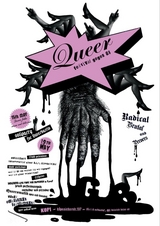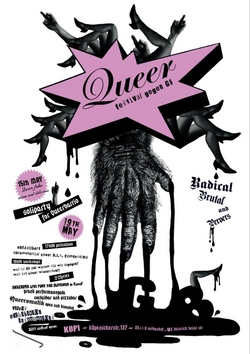
2007-05-14
These points are not rules set in stone, more tools to inspire and help us.
They are the result of a workshop which took place at the preparation weekend in Berlin.
There will be ongoing discussion anyway while the Barrio is up and running about how it should function.

MEETINGS:
Translation/interpreting: Before each meeting we should ask who needs translation.
Meetings should be once a day, and there should also be a daily information briefing on new situations as well as a notice board where new information can be posted.
There should be a time limit on meetings.
Ideally there should be two chair-persons with one person keeping a list of who is next to speak and seeing that agreed rules are stuck to (such as sign language).
For big meetings we may use the so-called “fish bowl” system; we divide into smaller groups for discussion then a “spokesperson” feeds back to the larger group. This can help people who feel uncomfortable in larger meetings the chance to voice their opinion. It can save also save time.
BARRIO STRUCTURE:
There will be a kitchen, an info point, a safe box, a first aid box, a meeting place, a relaxation area and a quiet space.
There will be around 8 roles on the barrio each day - jobs someone needs to be responsible for: 3 people for conflict-resolution, 2-4 people in the kitchen, 2 people for radio/telephone (if we decide to have one) and safe box.
We should also send 2 people to all meetings of the main camp and help with the main camp structure (sanitation, security, conflict-resolution, info point)
GENERALLY:
Form small affinity groups of 3-6 people within the barrio to look after each other. For demos and actions these groups are essential.
Bring energy and time to the camp!
Be prepared to take responsibility and take on shifts for as many roles as you can at the barrio.
People should also respect each other’s limits; different people have different skills and not everyone can do every task.
Be a part of a political camp, don’t just come here for a holiday.
Take responsibility for yourself and take initiatives.
If you do need to take a break, say this as soon as possible so that someone can take over the role.
People should be free to make constructive, helpful criticism, not expressed personally, and try to be open to criticism from others.
DRUGS:
Drugs and alcohol should be used responsibly. There should be at least one completely alcohol-free, drug-free space.
Be prepared to deal with all prejudices and discrimination including those based on class, sex, race, image, anti-Semitism, homophobia and trans-phobia.
CONFLICT RESOLUTION:
The conflict-resolution group should be different every day.
The group should consist of 3 people, suggested procedure is that one person acts as spokesperson for each “side” of the conflict and the third person mediates. Ideally these people should not be directly involved with the people having the conflict.
SPOKESPERSON FOR CRISIS-SUPPORT
There will be a crisis-support group within the main camp. Everyone should know where this is and escort people from their affinity group who are suffering trauma and crises there. If a group member cannot do this, the conflict-resolution team will take over.
[http://www.queersagainstg8.blogspot.com/]

